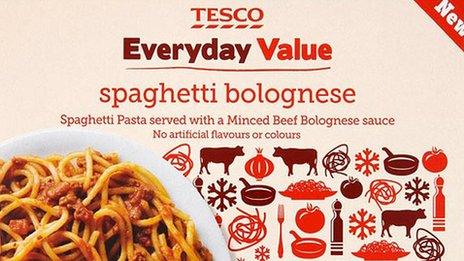Horsemeat scandal: Tesco reveals 60% content in dish
- Published

Some Tesco Everyday Value Spaghetti Bolognese contains 60% horsemeat, DNA tests by the retailer have found.
The meal, withdrawn from sale on Tuesday, came from the French factory producing Findus beef lasagne, also at the centre of a row over horsemeat.
Meanwhile, Environment Secretary Owen Paterson has told MPs of plans to test all processed beef in the UK.
Romania has rejected claims that it was responsible for wrongly describing horsemeat from its abattoirs as beef.
Tesco took the frozen bolognese off the shelves when it found out Findus was concerned about the source of its meat processed by Comigel, based at Metz, north-eastern France.
Environment Secretary Owen Paterson: "This appears to be an issue of fraud and mislabelling"
It is one of several products that have been withdrawn from UK shelves amid the current scandal over horsemeat in food products in the UK and Europe.
Tesco Group technical director Tim Smith said: "The frozen Everyday Value Spaghetti Bolognese should contain only Irish beef from our approved suppliers. The source of the horsemeat is still under investigation by the relevant authorities.
"The level of contamination suggests that Comigel was not following the appropriate production process for our Tesco product and we will not take food from their facility again.
"We are very sorry that we have let customers down."
Testing time
Mr Paterson told MPs he had called in representatives of all Britain's producers, retailers and distributors and "made it clear" he expected to see immediate testing of all processed beef products across the supply chain.
He said testing should take place every three months, and the Food Standards Agency should be notified of results.
He told representatives from the British Retail Consortium, the Food and Drink Federation, the British Meat Processors Association, the Federation of Wholesale Distributors, the Institute of Grocery Distribution and individual retailers that he expected to see:
- "meaningful results from this testing by the end of this week;
- "more testing of products for horse along the supply chain and that the industry must co-operate fully with the FSA on this;
- "publication of industry test results every three months through the FSA;
- "and that they let the FSA know as soon as they become aware of a potential problem in their products."
In the Commons, Labour's Mary Creagh accused Mr Paterson of being too slow to respond as incidents emerged.
"The secretary of state had to be called back to London from his long weekend to deal with the crisis." she claimed. "Until Saturday's panic summit, he hadn't actually met the food industry to address this crisis."
News of the tests came after the Romanian Prime Minister earlier on Monday denied two abattoirs in his country sold horsemeat purported to be beef to European food companies.
The abattoirs had been linked to the contamination of processed meat products sold in Europe. Victor Ponta said checks were carried out and there had been no breach of rules and standards.
In France, consumer affairs minister Benoit Hamon said that the whole of the food industry would be under heightened surveillance, with more random sampling of products and wider use of DNA tests to determine the origin of meat.
French inspectors were at the Comigel headquarters in Metz in north-eastern France on Monday. Findus meals were made by the company at its Luxembourg factory.
Investigators were also at the offices in the south of France of the importer Spanghero, which brought the meat to France from Romania.
Last week Findus UK took its frozen beef lasagne, made by Comigel, off the shelves after some samples were found to contain up to 100% horsemeat.
Shadow Environment Secretary Mary Creagh: ''The Secretary of State had to be called back to London from his long weekend to deal with the crisis''
Seven French supermarkets have withdrawn frozen ready-meals made by Findus.
And on Monday night, one Dutch supermarket chain took the Prima Frost brand of lasagne produced by Comigel off the shelves, amid fears it may contain horsemeat.
A third of people in the UK who responded to a poll on Monday on their shopping habits said they were less likely to buy processed meat as a result of horsemeat scandal.
A quarter of the 6,221 people who replied said they did not buy processed meat anyway and a further third (36%) said it would not make any difference to their shopping habits.
The poll was conducted by the market research company Kantar.
Mr Paterson said he would meet with his European counterparts and the European Commissioner for Health and Consumer Policy Tonio Borg later this week in the wake of the scandal.
"At the moment this appears to be an issue of fraud and mislabelling.
"But if anything suggests the need for changes to surveillance and enforcement in the UK we will not hesitate to make those changes," he said.
- Published11 February 2013
- Published11 February 2013
- Published10 April 2013
- Published11 February 2013
- Published10 February 2013
- Published10 February 2013
- Published9 February 2013
- Published18 January 2013
- Published19 January 2013